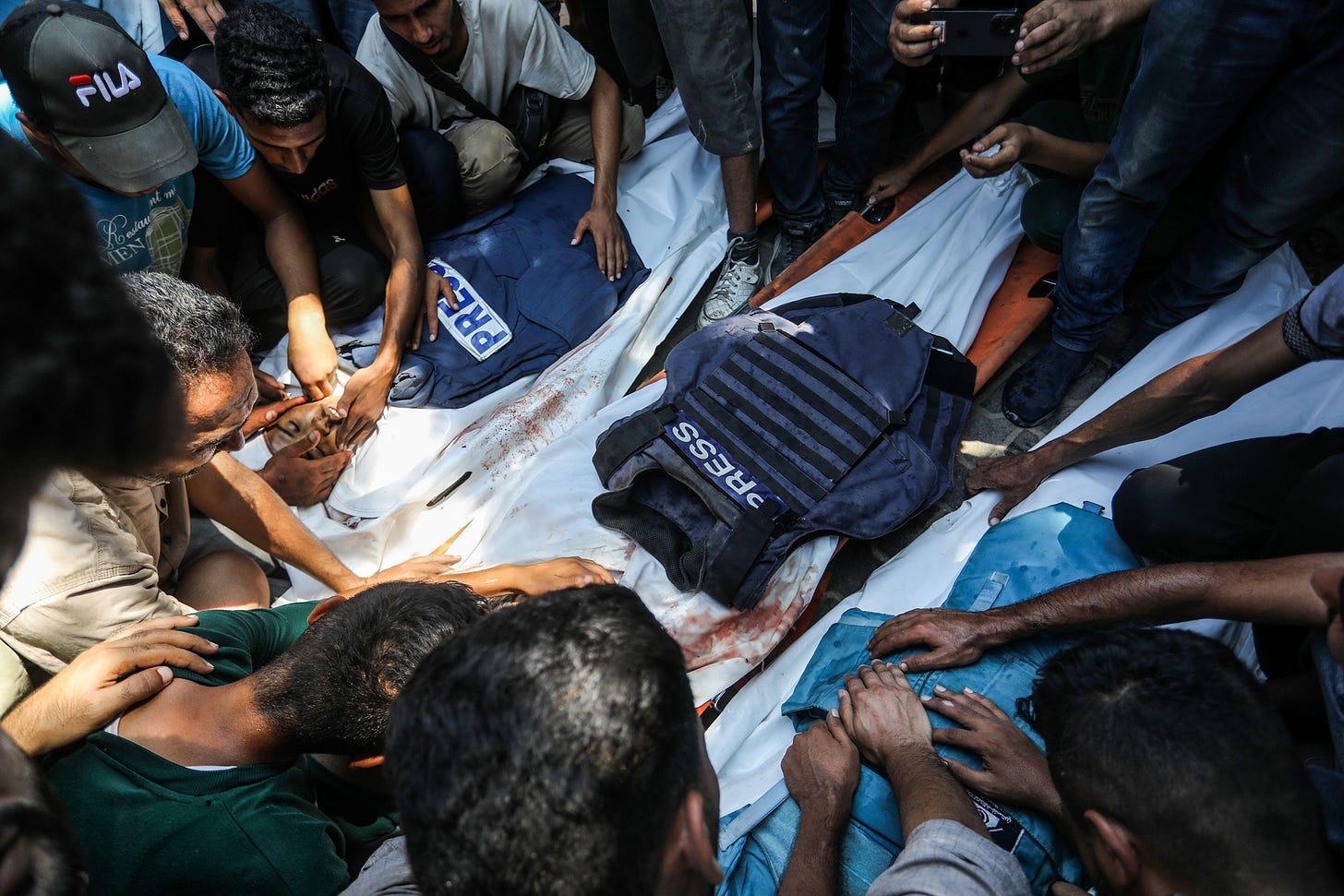Hot Type: Journalist Genocide
Heidi Siegmund Cuda reports that the killing of journalists is another genocide occurring in the Gaza war, the deadliest conflict for journalists in history

In many respects, the embers of journalism were already faint in the 1980s. That was the decade of the death of the “mom and pops” — tenacious family-owned newspapers in small and large towns were being gobbled up by multinational corporations.
Where once the Fourth Estate was revered for its dedication to truth, it became something else. In-depth reporting was drowned out by soundbites. Newspapers struggled as the internet offered “news” for free.
And then one day, we all woke up and a half dozen corporations owned the media, and many so-called news outlets marched in lockstep with Russian and foreign enemy state propaganda that was — is — hacking our minds.
And this week, for example, instead of dedicating resources and coverage to the real-time genocide of journalists occurring in the war in Gaza, America is flooded with meaningless headlines about Cracker Barrel’s logo change.
We’ve become that stupid.
So perhaps the death of journalism already occurred, and we’re just now offering the elegy.
And yet, those of us who came up in journalism before its hostile takeover still feel a civic duty to report the truth.
In the decade since I escaped from corporate news, I found a way to remain independent — no small thing. Outlets like Byline Times offer a home to the fiercely independent-minded reporter, and that is why I can report the facts that matter in a sea of total shite.
Killing Journalists
To that point: the killing of journalists in the Gaza war is its own genocide. According to the Costs of War Project, it marks the single deadliest conflict for journalists in world history.
By mid-August, Israel had killed up to 274 journalists, with 269 of them Palestinian, according to aggregate data from the Committee to Protect Journalists and the International Federation of Journalists.
The Watson Institute for International and Public Affairs puts this staggering number in perspective: since the war in Gaza began on Putin’s birthday in 2023, more journalists have been killed than the combined total during the US Civil War, World War I, World War II, the Korean War, the Vietnam War — including related conflicts in Cambodia and Laos — the Yugoslav Wars of the 1990s and early 2000s, and the war in Afghanistan, post-9/11.
Reporters Without Borders (RSF) has filed four complaints with the International Criminal Court (ICC) regarding war crimes against journalists in Gaza since 2023. In addition, the organization has requested the ICC allow surviving Palestinian journalists who are victims of Israeli war crimes in Gaza to be allowed to participate in the proceedings, calling it a “new step toward holding the Israeli military and its leaders accountable for the crimes committed with impunity on Palestinian territory.”
As independent investigative reporter Carole Cadwalldr wrote: “The targeting of journalists in Gaza and the failure of the media to show collective solidarity and to take collective action is…incomprehensible. I feel a such profound sense of shame and failure. It’s not just the death of journalists. It’s the death of journalism.”
She wrote that on Tuesday in reference to the news that three more journalists were killed this week in a single Israeli strike. So the number of dead journalists continues to spike upward.
If we look further over the waves to Russia, Georgia, Belarus, and Ukraine, we can see that journalists remain under siege.
Since its full-scale invasion on 24 February 2022, Russia has targeted Ukrainian and foreign journalists covering its war crimes in Ukraine. Reporters Without Borders reports that about 150 journalists have suffered “forced disappearances, shootings, executions, and hostage-taking”. In Georgia, an estimated 50 reporters experienced “physical attacks, verbal abuse or obstruction, as police dispersed the pro-EU demonstrations”, according to Mapping Media Freedom.
In Belarus, 37 journalists remain in prison and 39 media organisations have been declared “extremist formations”, five years after President Aleksander Lukashenko’s fraudulent electoral victory, according to the National Union of Journalists.
The list of journalists who have been murdered in Russia since the early ‘90s appears endless. When award-winning investigative reporter Anna Politkovskaya was assassinated in Moscow on Putin’s birthday in 2006 — after surviving a poisoning and imprisonment — maybe because the world looked on and did nothing, we are where we are today. A stealth genocide of reporters is occurring and the world navel gazes.
And then there’s America, where press freedom continues receding — falling to historic lows — while Russian-paid propagandists litter the White House press pool.
And the thing is, we matter. Journalists do matter.
As Nobel Peace Prize-winning reporter Maria Ressa stated: “First they came for the journalists. We don’t know what happened after that.”
Emmy award-winning investigative reporter, Heidi Siegmund Cuda is an American correspondent for Byline Times and her Hot Type column runs weekly in Byline Supplement. She is the co-host of RADICALIZED Truth Survives podcast and her Bette Dangerous Substack is read in 90 countries.

